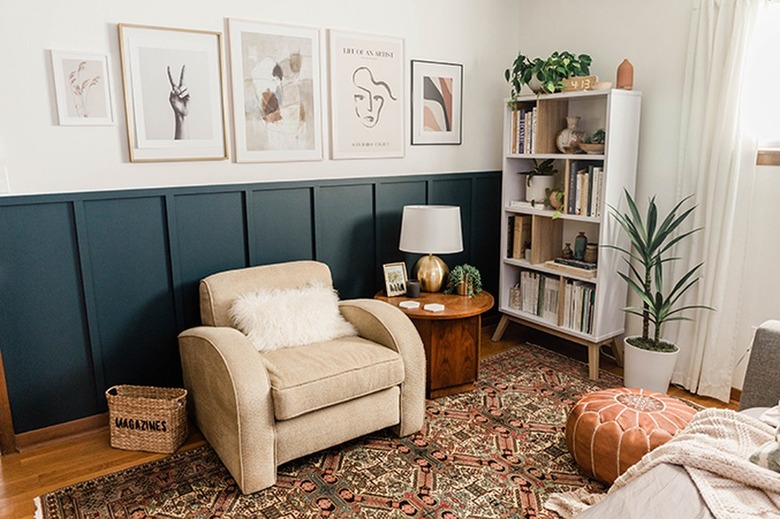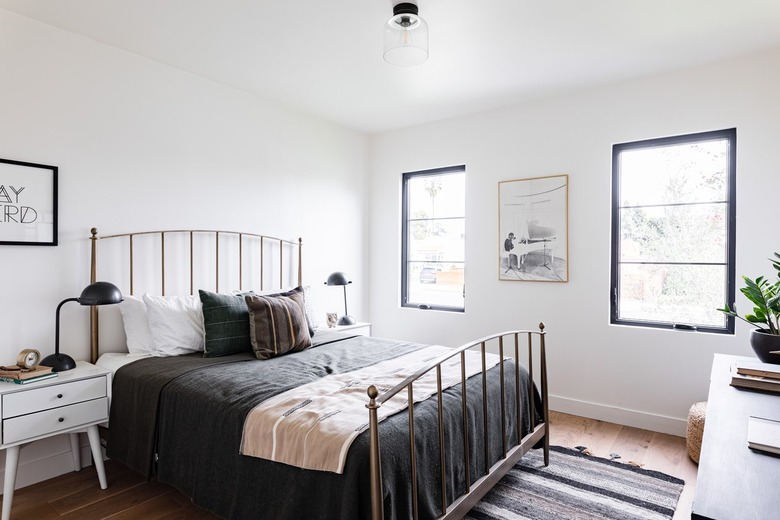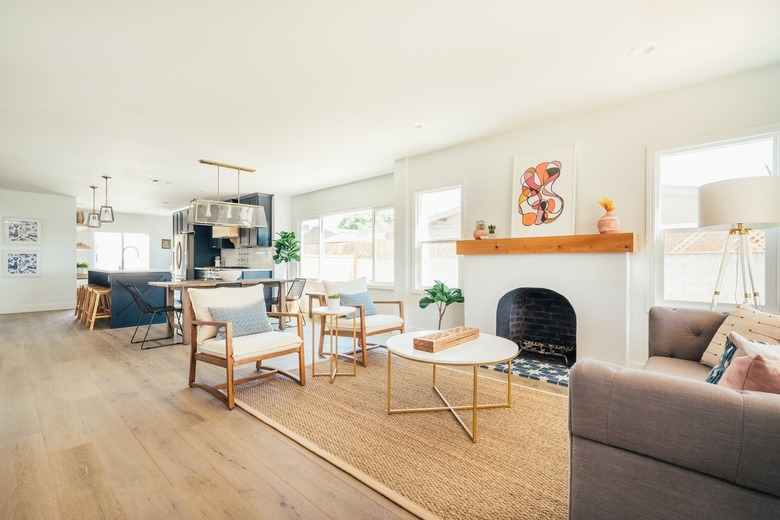What A Home Stager Costs — And How To Hire One
You found your dream home, and you're ready to put your house on the market, but when you look around, you see clutter, too much personalization, or a canvas that's so blank it's uninspiring. Take that as a sign that you need a professional home stager to help. Hiring a home staging service can really make a great first impression on prospective homebuyers and inspire them to make a top-dollar offer.
Ready to hire a home stager, but not sure where to start? Here's all you need to know about how much it costs to hire this type of pro and what the home staging process is actually like.
Tip
You can expect to pay about $2,000 to $2,400 per month to have a 2,000-square-foot home staged by a professional. Staging services often include monthly fees and a contract for a minimum amount of time.
What a Home Stager Does
A professional home stager uses design knowledge to prepare your home to be listed. Home sellers hire staging companies to create a presentation that makes the home more appealing to potential buyers of all stripes. The goal is to make your home attractive and clutter-free without much personalization so the prospective buyers can envision themselves in the home.
Experienced home stagers consider your target audience and local trends to arrange furniture, decor pieces, artwork, and other accents to create a home look that fits your ideal buyer. They also use the staging process to make the home feel comfortable, functional, and spacious or to improve problems. A home stager can improve the flow of your living room into your dining room to make the space feel open with good traffic flow, for example. If you're targeting young families, the home stager might create a kids' playroom in an unused space to help families picture their kids playing there.
Home stagers can use the existing furniture and decor in an occupied home, which saves you money on staging. They focus on decluttering, depersonalizing, and reorganizing the existing pieces. If you're selling a vacant home or your current furniture doesn't fit the look you're seeking, the staging company may also offer furniture rental to make your home feel less empty, cozier, and perfectly suited for your ideal buyer.
Doing Your Homework
The monthly home staging cost is usually based on a per-room basis. Prioritizing the rooms you want to have staged instead of staging every room can save money. Before choosing a staging company, know which rooms need the most attention. The kitchen, dining room, living room, and primary bedroom are the rooms where most potential homeowners focus their attention when shopping for a home. Having those rooms staged gives you a better return on your investment.
Discuss the possibility of staging your home with your real estate agent. Some agents can offer staging advice for projects you can do yourself based on their knowledge of showing homes. Others offer staging services as an add-on to your listing package. This is often charged as a percentage of the selling price, typically 1 to 3 percent, which the real estate agent takes at closing. Consider the recommendations and options from your agent before looking for a separate home stager.
Think about your ideal buyers and what they want in a home. You might not be a design expert, but you likely have an idea of what general style would work well or what changes need to be made to your home to attract buyers. This helps you find a stager who understands those needs and can create an ideal look based on your home style.
Why Hire a Home Stager
When homeowners hire a home stager, the home typically sells quicker and for a higher amount. The money you spend on a home stager can pay off. According to the National Association of Realtors, staged homes sell 88 percent quicker on average with a selling price that's 20 percent higher compared to nonstaged homes. Homebuyers are willing to pay more for a home if it looks polished and they can picture themselves living there.
Home stagers can make your home more appealing by playing up the best features and downplaying the less appealing parts. Staging makes your home photograph better, which is important since most buyers start their search by looking at online listing photos. This positive first impression encourages more buyers to schedule showings, which can shorten your home's time on the market.
Letting someone else handle staging also saves you time. When you're preparing to sell your house, you likely already have a lot on your to-do list. Figuring out how to stage your home can be time-consuming and stressful. A professional home stager can tackle the project quickly with little disruption to your day. Plus, if you're still living in the home, you get to enjoy the improved flow and aesthetics of the space until you move.
Choosing the Right Home Stager
Pricing that fits your budget is always a concern, but choosing the right home stager also requires someone who is a good match for your property. You want someone with not only general staging experience but also previous projects similar to your home. If you hire someone who is used to staging million-dollar mansions, he might be out of touch with the target demographic for your starter home.
Asking the right questions helps you gather information that makes it easier to compare the options. Ask all stagers you're considering some questions:
- How long have you been a home stager?
- Where did you get your staging experience?
- Are you a member of the Real Estate Staging Association?
- Are you a full-time home stager, or is this a side job?
- What kind of insurance do you have, and can I see proof of insurance?
- What are your rates?
- Do you have a minimum contract length?
- May I see a copy of the contract?
- Do you offer consultations if I want to DIY the staging?
- What is the average amount of time your staged homes stay on the market?
- What type and price range of homes do you typically stage?
- Where do you get your design inspiration, and how do you know what trends to incorporate into your staging?
- How do you decide what each home needs or how it should be staged?
- How long will the staging process take?
Ask for a portfolio or photos of several past jobs to get an idea of the stager's competency and typical style. Look for someone with a wide range of styles tailored to each home instead of one standard look used for every project. Ensure the photos on the stager's website are photos of her actual work and not stock photos, which can be misleading. Look for online reviews and ratings for the home stager to see what past clients think of the results.
The Cost of Hiring a Home Stager
The average cost of staging depends on various factors specific to your home. You can expect to pay about $2,000 to $2,400 per month to have a 2,000-square-foot home staged by a professional. That includes the cost to rent furniture and decor. If you only want the stager to declutter and rearrange your existing furniture, you can expect to pay a flat rate of about $800. If the stager needs to add furniture or decor to your existing pieces, you'll pay a monthly rental fee for those items.
Understanding the staging process helps you better break down the costs. You'll start with an initial consultation with your home stager, which typically costs between $300 and $600. For every room you have professionally staged, expect to pay $500 to $600 per month. If your stager charges $500 per room per month and you have four rooms staged, you'll pay $2,000 per month. There might be additional fees for things like professional cleaning, painting, or extra help to move furniture.
Most home stagers require at least a three-month contract, even if you sell your home immediately. So, you could be responsible for paying $6,000 for those four rooms plus the initial consultation fee, even if you sell your house in the first week.
Your specific situation impacts the exact pricing you'll pay for professional staging. Several factors can impact the cost of having your home professionally staged:
- Home size: Larger homes that need to have more rooms staged naturally cost more. They might also call for larger furniture or extra furniture to fill the space appropriately, which can bump up the staging price.
- Home layout: If you own a multistory home with lots of stairs or there's no easy way to get furniture into your home, expect to pay more. The home stager might need to hire extra help to move everything into your home, and they'll pass on that expense to you.
- Empty vs. occupied: When staging an empty house, the home stager has a blank slate, but they'll also have to provide all the furniture, which is where your monthly costs come in. If you're still living in your home, the stager can often work with what you have, which saves money.
- Current decor: If you have lots of knickknacks or highly personalized decor that might not appeal to a larger audience, the home staging process involves more prep work. The stager will declutter the space first, which can add to the overall cost.
- Condition of the home: Home stagers can hide some flaws in your home, but if you have major home improvement projects that need to be done, you might have to do those first. For example, the stager might suggest painting the walls in a room. Even if you DIY the painting, you'll have extra expenses for the paint, rollers, trays, painters' tape, and other supplies.
- Number of rooms: You get to decide how many rooms you have staged. If you only want one room staged, you'll pay a lot less than you would if you had every room staged.
- Cleanliness: If your home needs a lot of cleaning, the stager might hire a professional cleaner, which bumps up the total price.
You can save money on home staging by doing only the initial consultation with a professional. The stager can give you a plan for staging, and you can DIY the actual work. This can be especially beneficial if you're still living in the home and already have existing furniture you can use. A walk-through consultation may only cost you $125 for a 90-minute session.
Home Stager Certification
A home stager doesn't need any licensing or certification to offer home staging services since it's an unregulated industry. Some home stagers have interior design experience, which might include an interior designer license if your state offers a licensing program. Other stagers simply have an eye for interior design. This also means that anyone can call himself a home stager and charge whatever he wants, even if he doesn't have much experience. That's why vetting a home stager before hiring is so important.
The Real Estate Staging Association is a respected organization that supports home stagers and offers accredited education programs. Finding a stager who has taken classes through the organization can give you better results. While there are still no guarantees, someone who has taken some design or staging classes is often better equipped to handle your project.
References
- Realtor.com: How Much Does Home Staging Cost — and How Much Will You Gain?
- HomeAdvisor: How Much Does It Cost to Stage a House?
- Realtor.com: 10 Questions to Ask a Home Stager Before You Hire One
- Real Estate Staging Association: RESA Accredited Home Staging Training Providers
- Realtor.com: Behind the Scenes: Stage Your Home Like a Hollywood Star


